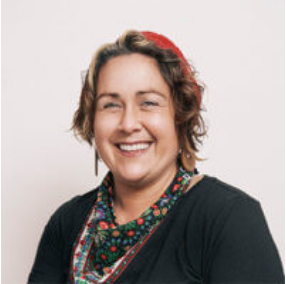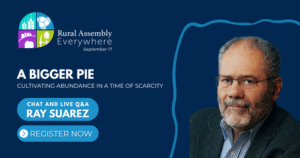We are igniting the 2018 National Rural Assembly with our firestarters – committed citizens who are modeling for the nation how we mend and strengthen the social and civic fabric of our country. They are lighting fires and sparking change, each in their own way and in their own place, and we had the pleasure of speaking with Diana Oestreich recently. This is a guest post from Elena Kaye-Schiess reporting on the conversation.
“The bravest thing I have ever done is to… in a way, publicly say, ‘I am a soldier, and I am a peacemaker,’ because it is not popular for either group – like, I knew that we are always told you have to be one or the other; and I believe it’s a false narrative – it’s not true either you are with us or against us. But that is very much the lens we’ve been told… So, the bravest thing I’ve ever done is just to own both parts of myself that’re true and to honor that, and to actually invite other people into choosing that it’s not us vs. them, and that you don’t have to be either/or, and there’s not just two camps – we can passionately love our country and passionately love our community and it might look different than what we’ve been told,” says Diana Oestreich, who will be a Firestarter at next week’s National Rural Assembly convening in Durham, NC .

As a third generation army veteran, Diana grew up in a small, tight-knit community in northern Minnesota of about 8,000 residents. Raised in a family of veterans who she looked to as heroes, she was instilled with a core value at a young age that service to your country is who you are and how you love your country.
“The only heroes I saw were the people who wore the uniform or had the triangle box on their mantelpiece or were policemen,” says Diana.
Growing up in a town without a lot of economic mobility, and having little, if any, guidance on how to apply to college, but generations of knowledge when it came to military service, at 17 years old Diana joined the National Guard as a combat medic. In 2013, at 23 years old, she was called to serve in Iraq as part of troop insurgency and preemptive strike.
Soon after, she found herself with only a medic bag on her back in the middle of a war zone. One of the very first nights was an inflection point, not just for her career, but for her entire belief system, which was called into question when her sergeant explained:
“’We are going into enemy territory tomorrow, and it is a common enemy tactic to push a little Iraqi child in front of the convoy, in order to stop the trucks, in order to attack the soldiers at the rear of the convoy. I hope you understand your duty to do whatever you have to do to keep that convoy rolling, even if it includes harming a child. And if anybody isn’t able to fulfill their duty, and protect their battle buddies, stand up now and identify yourself.’”
“That was the longest night of my life,” Diana recalled, “And it was the first time that I had to make a choice and confront my beliefs with our practicality of, well, what does this really mean, when it actually means taking a life for my country, and, in fact, a little child’s life.”
That was the moment when she rearranged everything she thought she knew, everything that she believed, and everything she thought was right and heroic.
Diana ended up deciding she was going to lay down her weapon and fight for peace – like every solider wants – but she was going to do it with sacrifice, instead of taking a life. She stopped loading her weapon and decided that she would step in front of a bullet for anyone, but she just wasn’t going to take a life.
After Diana returned home from the war, was married and had children, she found herself not knowing how to live out this idea. It took meeting her enemy to realize that she could love her enemy. She realized that most people she saw in her community who weren’t like her, she saw as “other.”
It wasn’t until she came across a group called Preemptive Love Coalition, that she began to find her place again. This group was started in Iraq at the height of the war in 2007, because they believed there were communities at odds – America and Iraq, Sunnis and Shias – and that if groups at odds could move toward each other, that they could create new stories and could unmake violence.
Diana remembers when she first came across Preemptive Love’s tagline – “Violence unmakes the world, but preemptive love has the power to remake the world.” And for her, it was like hope and oxygen after being quiet for nearly 10 years after returning home, because of the cost of belonging she feared she would lose if she spoke her true war story. Then she thought, “If they can do it in the middle of Iraq, then I can do it back where I am from.”
“I joined a whole bunch of friends who believed that we can unmake violence, and we can actually move toward the people that we are told to fear and toward the people we are told to see as ‘other’ – that we can actually create new stories of friendship, and friendship over fear, and hope over hate, and so, that has really revolutionized my life,” Diana explained.
For Diana, this idea of being courageous is that you can actually move towards someone who doesn’t have the same faith as you, someone whose ideas you may actually think are threatening – not only to you, but to the wellbeing of your family. And if you move toward them, then you can actually make a stronger community together and don’t have to fear each other’s differences.
“That has really lit a fire under me. And it has helped me reimagine – when polarizing things happen on the news, I don’t feel so helpless, because that’s not the end of the story, for me. So it has really changed how and who I listen to in my community. It just ignited me to move toward people who I didn’t already listen to,” according to Diana.
Ignited by this fire, she and her family reached out to a local mosque to meet their Muslim neighbors; she created an unlikely friendship with an Iraqi family in her city, and they celebrated Good Friday together last year. She also brought her kids to march with Black Lives Matter when Michael Brown died, and she started volunteering with survivors of sexual assault and violence. After Hurricane Harvey, she reached out to four churches in her community, including a mosque and a synagogue, to work together to raise and send donations to a group in Houston.
She realized that moving toward people isn’t about agreement – because we belong to each other. We can build stronger communities if we refuse to ignore each other and refuse to demonize each other. Although we may have different positions, we are stronger together, and together we can build communities that, instead of excluding the “other” in order to feel safe or secure, include each other and are healthy places where we want our children to grow up.
This understanding compelled her to ask people to move past their political trenches, past their religious trenches and say, “If you cross enemy lines, then you are going to create something that wasn’t there before. You’re going to create a friendship and you’re going to create a new story, where otherwise there was only animosity and fear.”
Diana sees herself as a peacemaker and works to spread the belief that if we show up, if we sacrifice and if we choose each other, then we can make a difference.
Diana believes that “no soldier goes to war to make more war. We go to war because we believe there is peace and that there is better and that it is worth working for. So it has ignited me as a veteran to continue to show up in my community believing that we can create a better story if we’re willing to sacrifice and show up with each other, even with people we don’t agree with.”







